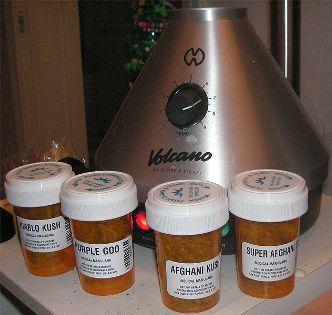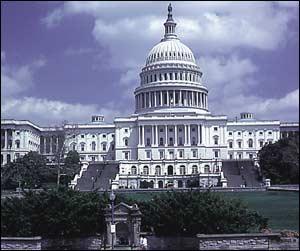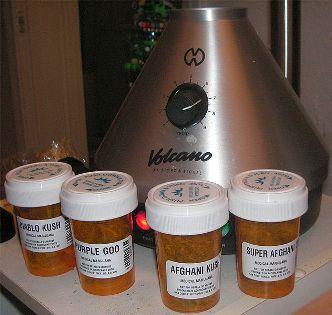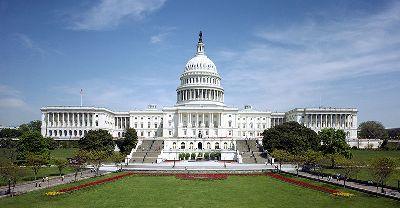Medical Marijuana
A Million Medical Marijuana Patients in California?
Three Medical Marijuana Bills Filed in Congress [FEATURE]
Bills to Ensure Fair Treatment of Medical Cannabis Industry Members Are Introduced in U.S. House (Press Release)
National Cannabis Industry Association
For Immediate Release -- WEDNESDAY, MAY 25
Bills to Ensure Fair Treatment of Medical Cannabis Industry Members Are Introduced in U.S. House
The logic behind the introduction of the “Small Business Tax Equity Act of 2011” and the “Small Business Banking Improvement Act of 2011” stands in sharp contrast to the actions of U.S. Attorneys who hope to keep medical cannabis sales underground, untaxed and unregulated
CONTACT: Steve Fox, NCIA dir. of public affairs at 202-379-4861 ext. 2 or [email protected]
WASHINGTON, D.C. – Today, for the first time in history, two bills that would benefit members of the medical cannabis industry were introduced in Congress. The introduction of the bills, which address banking and tax issues faced by medical cannabis providers, follow months of advocacy by the National Cannabis Industry Association (NCIA). The bills were part of a coordinated introduction of three bills to protect and support medical marijuana patients and providers in states where the use of medical marijuana is legal. The third bill, the “States’ Medical Marijuana Patient Protection Act,” would modify federal law so that individuals acting in compliance with state law are immune from federal prosecution.
The industry bills were introduced with bipartisan lead sponsors. Rep. Pete Stark (D-CA) and Rep. Dana Rohrabacher (R-CA) are the lead sponsors of the “Small Business Tax Equity Act of 2011,” which would amend Section 280E of the Internal Revenue Code so that medical marijuana providers can take standard business deductions like any other business. The “Small Business Banking Improvement Act of 2011,” sponsored by Rep. Jared Polis (D-CO) and Rep. Ron Paul (R-TX), would allow financial institutions to work with medical marijuana businesses without the fear of running afoul of federal banking regulations.
These bills have been introduced at a time when the nation is witnessing a strange reaction by U.S. Attorneys to the development of state-regulated systems of medical marijuana distribution. In October 2009, the Department of Justice issued a memo to federal prosecutors, instructing them to de-prioritize the prosecution of individuals acting in compliance with state medical marijuana laws. This has given states like New Mexico, Colorado and Maine the ability to establish tightly regulated system. Yet some U.S. Attorneys, faced with the prospect of sensible regulations being established in other states, have issued misleading and threatening letters to sidetrack legislative and administrative progress.
“There are hundreds of thousands of medical marijuana patients in this country who benefit when they are able to purchase their medicine from safe, reliable and regulated establishments,” said Steve Fox, NCIA’s director of public affairs. “It is time for the federal government to acknowledge that these businesses are providing a service to their communities, not causing them harm. Without these regulated, tax-paying businesses, all medical marijuana sales would occur underground. The profits would bolster the criminal market and local, state and federal governments would receive no tax revenue. These medical marijuana providers are not looking for special treatment. They just want to be able to function in a manner similar to any other legal business. That is what these tax and banking bills would allow.”
* * * * *
The mission of the National Cannabis Industry Association is to defend, promote and advance the interests of the cannabis industry and its members. NCIA publicly advocates for the unique needs of the emerging cannabis industry and defends against those aiming to eliminate the legal market for cannabis and cannabis-related products. For more information, please visit www.TheCannabisIndustry.org.
####

A Big Day on the Hill (Action Alert)
| |
Dear friends, It’s not often that three bills related to medical marijuana are introduced in Congress on the same day. In fact, it has never happened in history – until today! This is big news, and we are hoping you will help spread the word in Washington. All three bills would benefit medical marijuana patients and their providers. The “States’ Medical Marijuana Patient Protection Act,” which has been introduced in past sessions of Congress, would modify federal law so that individuals acting in compliance with state law are immune from federal prosecution. The other two bills – the “Small Business Tax Equity Act of 2011” and the “Small Business Banking Improvement Act of 2011” – have never been introduced before and address critical tax and banking issues faced by medical marijuana centers and dispensaries as they attempt to serve patients, comply with statewide regulations, and pay their fair share of taxes. Having lobbied Congress for years on these issues, MPP is excited to see the sponsors of these pieces of legislation sending a strong message to the rest of the nation about the need for the federal government to respect state medical marijuana laws and to treat fairly the individuals following them. Now that these bills have been introduced, we need members of the House to sign on as co-sponsors. This is where you come in. We have drafted an email for you to send to your U.S. representative. With less than two minutes of your time, you can let your representative know that his or her constituents care about this issue. This really makes a difference. The tides of history are turning in our favor. But with people like you speaking out, they will turn even faster. Thanks for taking action! Sincerely,
| |
To contact MPP, please click here or reply to this e-mail. Our mailing address is Marijuana Policy Project, 236 Massachusetts Ave. NE, Suite 400, Washington, D.C. 20002. Any donations you make to MPP may be used for political purposes, such as supporting or opposing candidates for federal office. | |
Patient Advocates Back Three Medical Marijuana Bills Introduced in Congress (Press Release)
For Immediate Release: May 25, 2011
Patient Advocates Back Three Medical Marijuana Bills Introduced Today in Congress
Advocacy Group Unveils New Program to Build More Skilled, Responsive Grassroots Force
Washington, DC -- Three medical marijuana bills were introduced today in Congress with support from patient advocates. The most significant of the three bills is one introduced by Congressman Frank (D-MA), which reclassifies marijuana from its current status as a dangerous drug with no medical value. Another bill, introduced by Congressman Polis (D-CO), will allow banks and other financial institutions to provide services to medical marijuana businesses without being subject to "suspicious activity" reporting requirements. The third bill, introduced by Congressman Stark (D-CA), changes the federal tax code "to allow a deduction for expenses in connection with the trade or business of selling marijuana intended for patients for medical purposes pursuant to State law."
"All of these bills will have a positive effect on hundreds of thousands of Americans and only a negligible impact to the rest of the country," said Steph Sherer, Executive Director of Americans for Safe Access (ASA), the country's largest medical marijuana advocacy group. "This kind of policy shift is a no-brainer and should garner the bipartisan support of Congress."
To shore up support for these and other local and state medical marijuana bills, ASA is launching a new advocacy program.
The introduction of Congressional legislation today comes as ASA is equipping patient advocates with new tools to lobby local, state and federal governments. ASA unveiled a new program today that establishes a "Medical Cannabis Think Tank "to provide activists the support they need to analyze pending or proposed legislation and to lobby for the best laws possible. To support the lobbying effort, ASA also unveiled its new "Online Training Center," with more than 4 hours of educational streaming video and over 400 pages of instruction manuals and worksheets. ASA's program also includes an improved "Raid Response Center" to better prepare for aggressive federal interference.
As part of its "Sick and Tired" campaign, ASA and others filed a writ Monday in the DC Circuit to compel the federal government to answer a 9-year-old petition to reclassify cannabis. The Coalition for Rescheduling Cannabis (CRC) argued in the writ that the government has unreasonably delayed an answer to the petition in violation of the Administrative Procedures Act. "The Drug Enforcement Administration has the opportunity right now to address the needs of patients across the country by reclassifying cannabis," continued Sherer. "However, since Congress can also reclassify cannabis, we are urging passage of the Frank bill in order to take advantage of all points of leverage."
If passed, the Frank bill would not only recognize marijuana's medical value, but also provide a medical necessity defense in federal court, a right not currently afforded to patients and caregivers who are in compliance with their local and state laws. The Frank bill would also usher forth greater research into the therapeutic properties of cannabis and create incentives for the development of new cannabis-based medication.
Advocates hope the Polis bill, if passed, will end the current ban on services for medical marijuana businesses by institutions like Wells Fargo, CitiCorp and Bank of America. The Stark bill has the potential to end dozens of audits by the Internal Revenue Service (IRS) currently taking place, and settle once and for all whether the IRS can demand tax on gross or just net proceeds.
Further information:
Rescheduling bill (Frank):
http://AmericansForSafeAccess.org/downloads/Frank_bill_2011.pdf
Banking bill (Polis):
http://AmericansForSafeAccess.org/downloads/Polis_bill_2011.pdf
IRS bill (Stark):
http://AmericansForSafeAccess.org/downloads/Stark_bill_2011.pdf
ASA Think Tank: http://AmericansForSafeAccess.org/section.php?id=384
ASA Online Training Center:
http://AmericansForSafeAccess.org/article.php?list=type&type=385
ASA Raid Response Center:
http://AmericansForSafeAccess.org/article.php?list=type&type=168
# # #
Washington Medical Marijuana Dispensary Bill Dies
Arizona Governor Moves to Block Medical Marijuana Dispensaries

Groups Sue Feds Over Marijuana Rescheduling Petition Delay
New Jersey Attorney General Meets with Medical Marijuana Advocates (Press Release)
FOR IMMEDIATE RELEASE: 5/25/2011
CONTACT: Ken Wolski at 609-394-2137 or [email protected], or Chris Goldstein at 267-702-3731
New Jersey Attorney General Meets With Medical Marijuana Advocates
[Trenton - New Jersey] Attorney General Paula Dow sat down with the Coalition for Medical Marijuana NJ (CMMNJ) on May 24th at her office in Trenton. The AG and her staff held the meeting to hear concerns from local advocates about the compassionate use marijuana program that has now been suspended by Governor Christie.
Ken Wolski RN, the executive director of CMMNJ, was grateful for the interaction.
“Attorney General Paula Dow and First Assistant Phillip Kwon took time out their demanding schedules to listen to some very serious issues for New Jersey's medical marijuana law," said Wolski, "Qualifying patients continue to wait for this program and we hope that some of their concerns were heard. The Office of the Attorney General plays a key role in the implementation and administration of the compassionate use law.”
On April 22, 2011 Dow sent a letter to the Department of Justice in Washington DC requesting clarification about the medical marijuana law. Several US Attorneys have recently issued letters in other states with a clear description of how federal authorities will prosecute medical marijuana facilities, even if they are permitted under state law. In Washington, Montana and other states the letters were accompanied by DEA raids of local medical cannabis dispensaries.
NJ Attorney General Paula Dow stated in the meeting that she sent a follow-up letter to the US Department of Justice, addressed to US Attorney General Eric Holder, on May 23, 2011.
Paul Fishman, the US Attorney for New Jersey, has not sent any communication regarding the NJ medical marijuana law before or after Dow’s requests. A spokesperson at the US DOJ said the April 22nd letter from New Jersey had been received and was under review.
Chris Goldstein, the media coordinator at CMMNJ also attended the meeting.
“Not a single person in New Jersey has been able to register for medical cannabis, despite many promises from Governor Christie,” said Goldstein, “But I think that we had a meaningful exchange of new ideas with Attorney General Dow. The intent of The Compassionate Use Medical Marijuana Act is to grant legal access to seriously ill residents. There are some methods that the AG's office can explore to actively protect New Jersey’s medical cannabis patients today."
New Jersey passed the first compassionate use law in the country that forces patients into a centralized system of just six Alternative Treatment Centers to access all of their state-legal cannabis. There are no provisions in the NJ law to allow patients or caregivers to cultivate cannabis on their own. The law was supposed to have been fully implemented in the summer of 2010 but has suffered numerous delays.
CMMNJ’s Ken Wolski is looking forward to meeting with the one state official who has exercised the most influence over the medical marijuana law: Governor Chris Christie.
“It is long past time for Governor Christie to actually meet with patients and advocates in our state to discuss the compassionate use law.”
Pagination
- First page
- Previous page
- …
- 254
- 255
- 256
- 257
- 258
- …
- Next page
- Last page






 Rob Kampia
Rob Kampia
